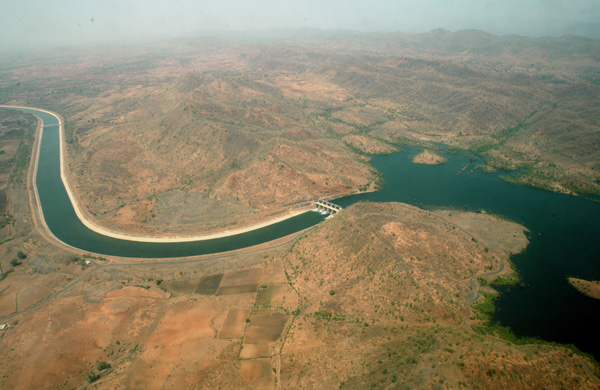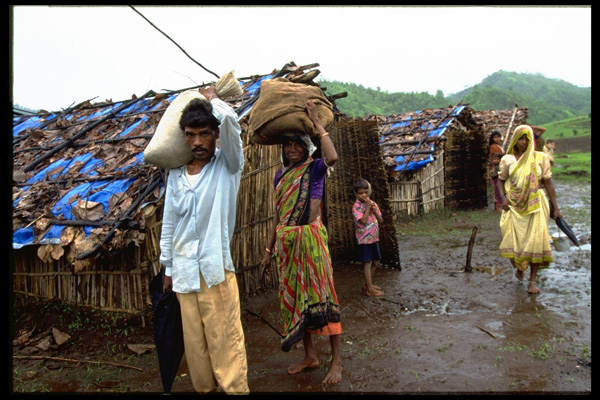Thirty years on, no reason for Narmada valley-dwellers to celebrate

In 1985, a young Medha Patkar began a journey along the Narmada river, organising locals against a proposed dam project that threatened to submerge their farms, homes and villages.
Thirty years later, on 17 July, over a hundred villagers from the area travelled to Delhi to mark the anniversary of what soon became a renowned movement, called the Narmada Bachalo Andolan against the Sardar Sarovar Dam.
It took nearly one-and-a-half days for them to reach Delhi from various villages in Maharashtra's Nandurbar and Madhya Pradesh's Badwani districts.
But there was no reason to celebrate, or reminisce, as basic questions over rehabilitation and resettlement continue to rage over what is one of the most prolonged such movements in the country.

View of the site of Sardar Sarovar Dam Yojana at Kevadia colony in Gujarat. Photo: Shailesh Raval/The India Today Group/Getty Images
Monsoon fury
Thirty years on, the resettlement of villagers is incomplete, and many living at the edge of the reservoir and the feeder streams of the river face the wrath of the monsoons, when their fields submerge.
Sunil Vaskale of Kundia, a hill-side village in the Badwani district of MP, says because the Narmada dam gates are closed, heavy rains lead to a rise in the water levels. This causes hill streams that flow into the Narmada to swell, flooding fields and sometime houses.
Such an experience was echoed by Badrilal of Pichhodi village, whose cotton and wheat fields get submerged every other August. Both he and Vaskale have had enough, and now demand that they be included in the rehabilitation program and get land elsewhere.
Resettlement is incomplete, and many living at the edge of the Sardar Sarovar face the wrath of the monsoons
Monsoon-related issues are one of the principal demands of the Andolan.
"The situation now is critical. The monsoon is due. About 100-200 homes are going to be submerged when the water level in the Narmada rises," Patkar said, adding that the Andolan is planning a massive protest along the river this season.
The state disaster management machinery is ill-equipped to deal with a calamity, she alleged. "There are few safe boats with a capacity of 50, which are meant to serve villages with at least a thousand persons," she said.
Incomplete resettlement
Gokul Pavra's ancestral land, and village, was submerged in 2003. He was resettled in Boradchhivar village in Nandurbar district. But the government has still not awarded land titles to the resettled farmers. Because of this, Pavra has been unable to get a ration card or Aadhar card.
Two years ago when his son was born, local authorities denied a birth certificate, asking him to go to the Taluka office of his original village. There, he was denied the certificate as he has been resettled elsewhere.
Additionally, no housing plots have been provided to Pavra and others who were resettled there. They live on their farms, meaning their houses are far from each other. "We feel so unsafe there. Anybody can come and rob the house," he said.

Displacement is a prime concern for activists. Photo: Robert Nickelsberg/The LIFE Images Collection/Getty Images
Claiming titles
Ilabsingh Telsingh, from village Savarya Leikhada of Nandurbar district, wants the government to allocate land titles to him and others in his village. The tribal village has traditional land rights, but is demanding titles since these are required to claim land as compensation from the government.
Seeing the experiences of other adivasis, whose land got submerged in the project, Ilabsingh and his village want to ensure that the same doesn't happen to them.
As the issues continue to burn in the Narmada region, Patkar and her associates led a delegation to Thawar Chand Gehlot, the Minister of Social Justice and Empowerment. The Narmada rehabilitation programme is overseen by his ministry.
According to sources, Gehlot assured Patkar that he will constitute a team to assess the problems faced in the Narmada valley.







![BJP's Kapil Mishra recreates Shankar Mahadevan’s ‘Breathless’ song to highlight Delhi pollution [WATCH] BJP's Kapil Mishra recreates Shankar Mahadevan’s ‘Breathless’ song to highlight Delhi pollution [WATCH]](https://images.catchnews.com/upload/2022/11/03/kapil-mishra_240884_300x172.png)

![Anupam Kher shares pictures of his toned body on 67th birthday [MUST SEE] Anupam Kher shares pictures of his toned body on 67th birthday [MUST SEE]](https://images.catchnews.com/upload/2022/03/07/Anupam_kher_231145_300x172.jpg)






